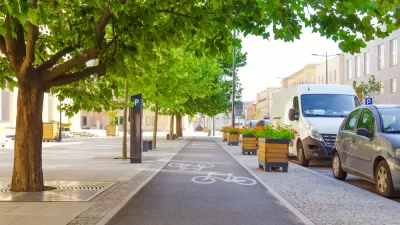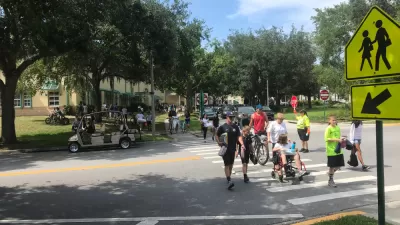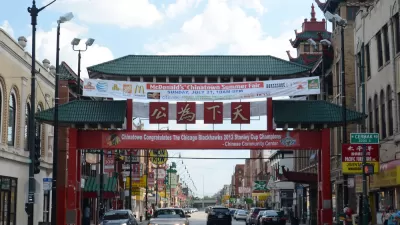What do traffic safety and gun violence have in common? A lot, as it turns out. In both cases, hard-hit neighborhoods tend to have suffered from historical disinvestment along racial lines.

Although gun violence and traffic safety might seem like unrelated ills, their severity tracks with "race, class, and place," Hanna Love and Jennifer S. Vey write. "The lower a metro area's median household income, the more dangerous its streets are for people walking. And similar trends persist for gun violence."
In urban areas, neighborhoods populated mostly by people of color tend to be poorer than white areas. That de facto segregation is of course no accident: it was once de jure. High rates of car and gun violence "stem from the same historical inequities in how our cities were designed and built, in which intentional decisions by planners and policymakers divided our nation's physical landscape along racial lines," Love and Vey write.
They argue that addressing both problems means acknowledging that for disadvantaged communities, making streets safer will require more than mere bike lanes. "For those who are vulnerable to victimization when engaging in everyday tasks—like walking to buy snacks or to work—concerns about safety impact nearly every aspect of their lives."
Love and Vey advocate better engagement with residents, asking them what they want from their streets and investing in safety strategies already being developed and led by those in the community.
FULL STORY: To build safe streets, we need to address racism in urban design

Maui's Vacation Rental Debate Turns Ugly
Verbal attacks, misinformation campaigns and fistfights plague a high-stakes debate to convert thousands of vacation rentals into long-term housing.

Planetizen Federal Action Tracker
A weekly monitor of how Trump’s orders and actions are impacting planners and planning in America.

In Urban Planning, AI Prompting Could be the New Design Thinking
Creativity has long been key to great urban design. What if we see AI as our new creative partner?

King County Supportive Housing Program Offers Hope for Unhoused Residents
The county is taking a ‘Housing First’ approach that prioritizes getting people into housing, then offering wraparound supportive services.

Researchers Use AI to Get Clearer Picture of US Housing
Analysts are using artificial intelligence to supercharge their research by allowing them to comb through data faster. Though these AI tools can be error prone, they save time and housing researchers are optimistic about the future.

Making Shared Micromobility More Inclusive
Cities and shared mobility system operators can do more to include people with disabilities in planning and operations, per a new report.
Urban Design for Planners 1: Software Tools
This six-course series explores essential urban design concepts using open source software and equips planners with the tools they need to participate fully in the urban design process.
Planning for Universal Design
Learn the tools for implementing Universal Design in planning regulations.
planning NEXT
Appalachian Highlands Housing Partners
Mpact (founded as Rail~Volution)
City of Camden Redevelopment Agency
City of Astoria
City of Portland
City of Laramie





























